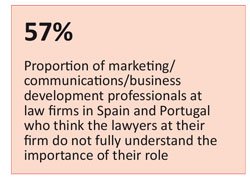Lower fees could mean poorer quality
Some Spanish law firms have cut their legal fees in recent years and, while this may tempt clients, it could mean the legal advice is of a lower standard, says Natra’s Sabina Díaz Luengo
For Sabina Díaz Luengo, legal counsel at Natra, legal fees are a secondary consideration when selecting external legal advisers. “Knowing the company and the business is very important as well as the ability to display that knowledge in the advice – I don’t want a legal opinion that is 100 pages long, but does not solve the problem.”
Díaz Luengo leads the legal team at Natra, which is involved in the provision of cocoa and chocolate products. In this context, she claims that the fees charged by law firms are a less important consideration than their ability to know and understand the client’s business. Indeed, Díaz Luengo says that a number of Spanish firms have been lowering their fees in recent years and that, while there may be an initial temptation to go for cheaper advice, this can sometimes result in the quality being compromised.
Substantial growth
Díaz Luengo has seen Natra change considerably since she started working with the company in 2003 while practising at Garrigues. She adds that the business has grown substantially from an organisation that had just two factories in Spain to one that now has factories and offices spread across the world – including Canada, France, Belgium and Hong Kong – with additional business interests in a number of other diverse markets. This expansion promoted the need for much more comprehensive legal services so, in 2008, she opted to join her client.
“Before 2008, Natra did not have its own in-house legal department and all the work was co-ordinated by Garrigues,” Díaz Luengo says. “As I had worked on most of Natra’s M&A matters at Garrigues, I opted to join to the company to establish the in-house legal department because I knew the whole story of the business – I had to start Natra`s legal function from scratch.”
Díaz Luengo points out that, since the inception of the in-house department, much of the core business advisory matters – such as commercial, IP and small transactions – have been handled internally. The larger or more complex mandates are sometimes passed to external counsel. “For a specialist piece of advice, I will go to the individual I think is the best,” she explains. “Work with cross-border components will require more resources.”
Using more law firms
Due to the fact Natra is a global business, many of the advisers the company turns to are international law firms, often with branches in key jurisdictions in which Natra operates. The firm now uses a wider selection of advisers than it did 2008 – when most of its legal work went to Garrigues – although Díaz Luengo prefers not to reveal any names. However, Natra has used Uria Menendez for a number of financing matters including a €130.8 million syndicated loan in September 2013, and the financing of working capital in August last year.
Díaz Luengo says that the company does not have a closed panel and will often engage other law firms via a tender process for specific deals or cases. “Our approach towards legal budgets has evolved, before it was more about trying to sort out a problem and then discussing fees,” she adds. “Now we have to be focused on our external legal spend and ensure it is sensible – many businesses in Spain have had to adjust their legal budgets but it can be seen as an opportunity.” Díaz Luengo continues: “For in-house legal teams, it means they can do more legal work themselves, which also helps them become a more important part of the business.”
A major piece of work currently occupying Díaz Luengo is Natra’s financial and business restructuring process, which began last year. She expects that the refinancing and restructuring work will take up a lot of her time in the next 12 months. For example, the company recently announced the placement of convertible bonds, as well as a syndicated loan deal and a complex three-stage capital reduction programme.
“Being an international business we have many rules and procedures to comply with,” Díaz Luengo says. “There are factors such as labelling, purchasing of raw material and tax that need to be addressed, and this becomes more complicated when you are operating on a global platform.”
Sabina Díaz Luengo is legal counsel at Natra











